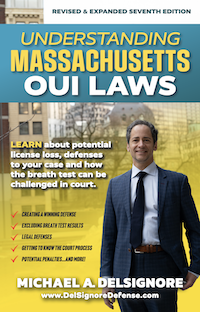How is Evidence Presented at an OUI Trial in Massachusetts?
At a Massachusetts OUI trial, the Commonwealth's case will typically proceed in the following manner:
- The Commonwealth will call the arresting officer; in many cases the arresting officer is the only witness called to testify.
- The Commonwealth may have a civilian witness who claims to have observed the driving that led to the motor vehicle stop.
- If a breathalyzer test was taken, the Commonwealth would have to call to the witness stand the officer that administer the test and the officer in charge of conducting the periodic testing of the machine pursuant to Massachusetts OUI law.
An operating under the influence charge has three basic elements; the Commonwealth must prove all three of the elements beyond a reasonable doubt (which is their burden).
- That you were operating a motor vehicle: The keyword here is operating, not driving; this means that you can be in park with the keys in the ignition and find yourself faced with an OUI charge.
- On a public way: This inherently means on a street in Massachusetts, but also extends to parking lots and other public areas you may not automatically assume are “public”.
- With a BAC of .08 or greater, your ability to operate a motor vehicle has been impaired by the consumption of alcohol: You do not have to be drunk to be impaired.
If you are facing an OUI charge that caused death or serious bodily injury to another person, the Commonwealth will have the burden of proving some additional facts. Each case is different, so please consult with a DelSignore Law attorney today.
At your Trial: What to ExpectAt trial, the police report does not come into evidence. The only evidence that is heard by the judge or jury is what the officer testifies to on the witness stand. As an experienced Massachusetts OUI lawyer, there are many cases where the testimony on the witness stand is drastically different from the police report.
The most common evidence presented by the prosecution is the testimony of the officer. Sometimes, there are witness statements, 911 calls, incriminating statements made by the person who was arrested, alcohol found within the vehicle, receipts showing that someone purchased alcohol, and video evidence from the cruiser or the booking area.
In some cases, the officer may leave out harmful facts that were written in the police report. If an officer adds information not in the report, through cross examination the officer's testimony can be impeached. It is important to remember that all police officers are different and when they are forced to testify in court and experienced OUI lawyer in Massachusetts can undermine the opinion that you were under the influence of alcohol.
Call DelSignore Law for a FREE consultationAn OUI case can take up to a year to fully resolve; all sentencing is determined by the judge. After a trial where a person is convicted, both sides can make an argument for whatever sentence they believe is appropriate. The sentence is ultimately determined by the judge. There are some typical sentences handed out in Dedham that can be predicted based on the facts of the case.
After a conviction, a party is entitled to file an appeal when they believe a miscarriage of justice or an error of law was made during the trial. That party can file a notice of appeal in the court.
If you call DelSignore Law today, we would be happy to discuss the specifics of your case with you, and by reviewing your police report, we will be able to identify the strengths and weaknesses of your case. Contact us today.
To learn more about court process if you have been charged with an OUI in Massachusetts, visit our website here.
 Dedham DUI Lawyer DelSignore Law Home
Dedham DUI Lawyer DelSignore Law Home
